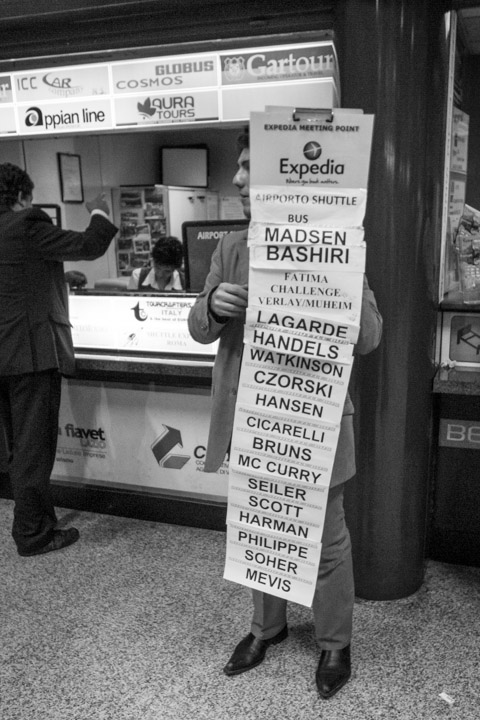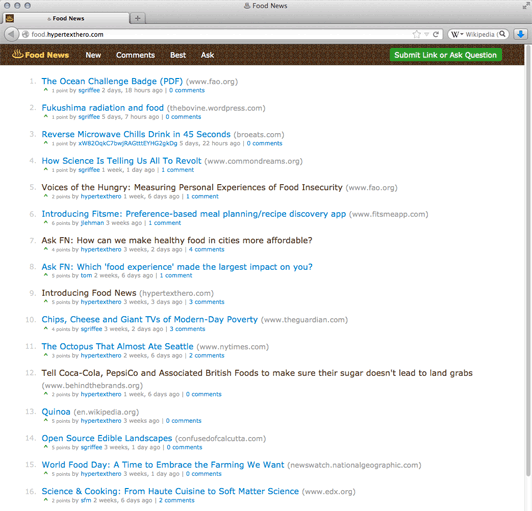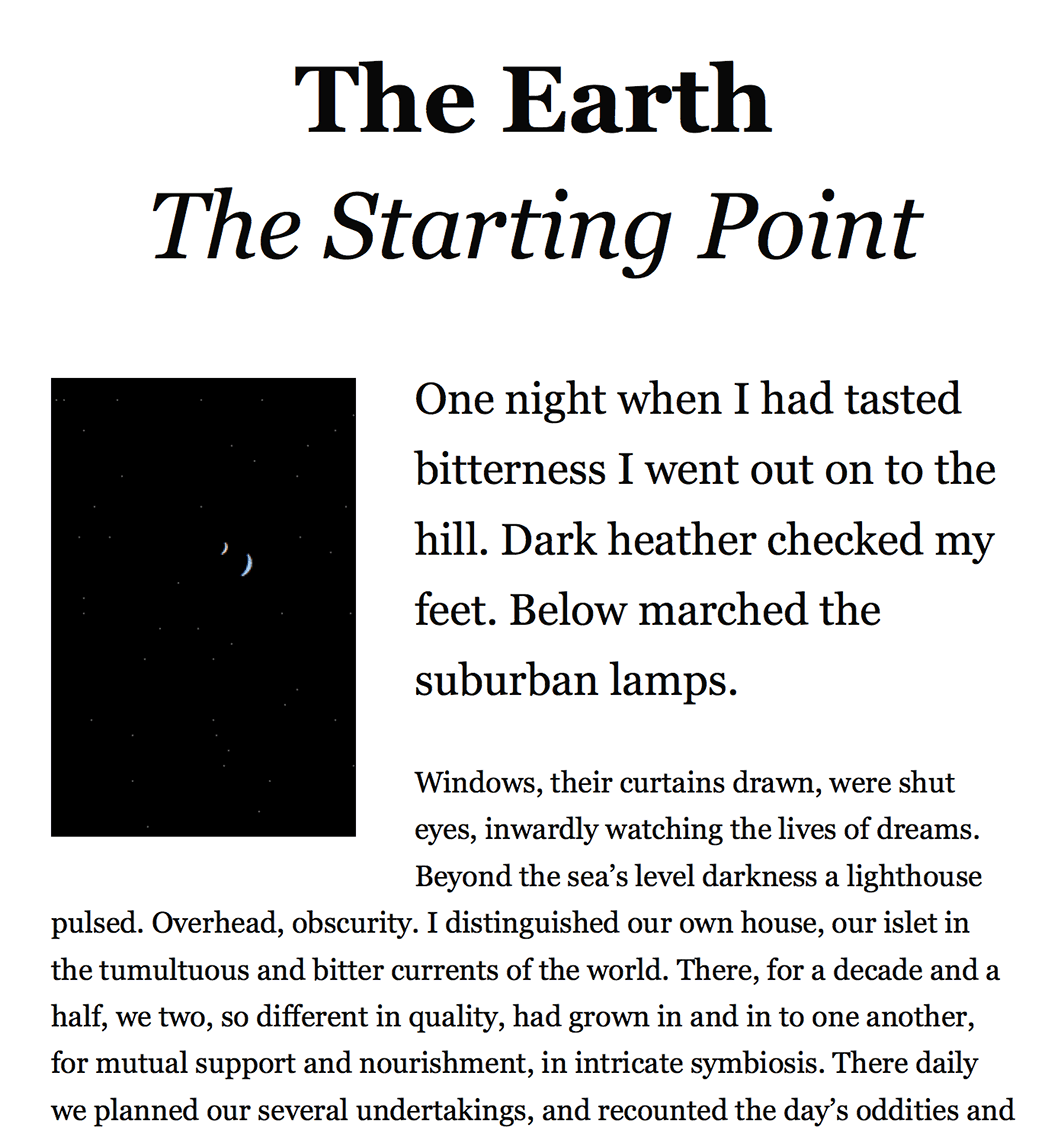
Simon Griffee
Department of graphic design, art direction, and photography.
January 2011
Editing
In photography the word ’editing’ traditionally means selecting the best photos from a set. This usually involves a large number of small pictures — ‘contact’ or ‘proof’ prints — laid out on a table, pinned to a wall, clipped to a string, or displayed in a user interface on a computer screen. The editor looks at the pictures, moves them around, culls the bad ones, keeps the best ones.

In the digital era the primary meaning of the word ’editing’ when applied to the word ‘photographs’ has become ’the manipulation of an image with photo editing software such as Photoshop’. Traditional editing became ‘photo organizing’ or ‘photo management’.
Editing means culling, improving, condensing, simplifying — removing the unnecessary, leaving the best. In this sense, when applied to photographs, and if you want to improve your photography, I think ’editing’ is a better word than ‘organizing’ or ‘management’, and it should be embraced in its traditional sense.
Endlessly manipulating a photograph with graphics software will not make it a better photograph or you a better photographer (though it will make a good picture sing). Taking more pictures, looking at them,1 and choosing the best, will.
Despite much mythology such as Cartier-Bresson’s Decisive Moment, the photographic act consists of two things: Shooting pictures and choosing which pictures to show.2 Most people only do the first, but editing is at least as important as shooting. As in many things in life, you have to choose, difficult as it may be.
To be honest, most of my pictures suck. The saving grace of that admission is that most of your pictures suck, too. How could I possibly know such a thing? Because most of everybody’s pictures suck, that’s how. I’ve seen Cartier-Bresson’s contact sheets, and most of his pictures sucked. One of my teachers said that it was an epiphany for him when he took a class from Garry Winogrand and learned that most of Winogrand’s exposures sucked. It’s the way it is.
— Mike Johnston, The Magic Bullet
-
Good advice: have prints of pictures you think you like hanging somewhere where you see them often. Pinned to a board on a wall, tacked to a mirror, taped to your monitor, anything. After living with the pictures for some time, you eventually ‘see’ the ones you really like, and the others fall away. ↩︎
-
A third thing could be ‘how to show the pictures’: Single print, book, gallery wall space, projection, website, and so on. ↩︎
Anna and Vronsky
‘Yes, I’ve wanted to tell you,’ she said without looking at him. ‘You acted badly — very, very badly.’ ‘Don’t I know that I acted badly? But who was the cause of my acting so?’ ‘Why do you say that to me?’ she said, glancing sternly at him. ‘You know why,’ he replied boldly and joyfully, meeting her eyes and continuing to look. It was not he but she who became embarrassed. ‘That proves only that you have no heart,’ she said. But her eyes said that she knew he did have a heart, and because of it she was afraid of him. ‘What you were just talking about was a mistake, and not love.’ ‘Remember, I forbade you to utter that word, that vile word,’ Anna said with a shudder; but she felt at once that by this one word ‘forbade’ she showed that she acknowledged having certain rights over him and hereby encouraging him to speak of love. ‘I’ve long wanted to tell you that,’ she went on, looking resolutely into his eyes, and all aflame with the blush that burned her face, ‘and tonight I came on purpose, knowing that I would meet you. I came to tell you that this must end. I have never blushed before anyone, but you make me feel guilty of something.’ He looked at her, struck by the new, spiritual beauty of her face. ‘What do you want of me?’ he said simply and seriously. ‘I want you to go to Moscow and ask Kitty’s forgiveness,’ she said, and a little light flickered in her eyes. He saw that she was saying what she forced herself to say, and not what she wanted. ‘If you love me as you say you do,’ she whispered, ‘make it so that I am at peace.’ His face lit up. ‘Don’t you know that you are my whole life? But I know no peace and cannot give you any. All of myself, my love…yes. I cannot think of you and myself separately. You and I are one for me. And I do not see any possibility of peace ahead either for me or for you. I see the possibility of despair, of unhappiness…or I see the possibility of happiness, such happiness’ he thought with rapture. ‘When I was already in despair, and when it seemed there would be no end — there it is! She loves me. She’s confessed it.’ ‘Then do this for me, never say these words to me, and let us be friends,’ she said in words; but her eyes were saying something quite different. ‘We won’t be friends, you know that yourself. And whether we will be the happiest or the unhappiest of people — is in your power.’ She wanted to say something, but he interrupted her. ‘I beg for only one thing, I beg for the right to hope, to be tormented, as I am now; but if that, too, is impossible, order me to disappear, and I will disappear. You will not see me, if my presence is painful for you.’ ‘I don’t want to drive you away.’ ‘Just don’t change anything. Leave everything as it is,’ he said in a trembling voice. ‘Here is your husband.’
— Leo Tolstoy, Anna Karenina, Part Two, VII
Rapture
She had not come close to Anna since her arrival, and here suddenly saw her again in a completely new and unexpected way. She saw in her a streak of the elation of success, which she knew so well herself. She could see that Anna was drunk with the wine of the rapture she inspired. She knew that feeling, knew the signs of it, and she saw them in Anna — saw the tremulous, flashing light in her eyes, the smile of happiness and excitement that involuntarily curved her lips, and the precise gracefulness, assurance and lightness of her movements.
…
‘No, it’s not the admiration of the crowd she’s drunk with, but the rapture of one man. And that one? can it be him?’ Each time he spoke with Anna, her eyes flashed with a joyful light and a smile of happiness curved her red lips. She seemed to be struggling with herself to keep these signs of joy from showing, yet they appeared on her face of themselves. ‘But what about him?’ Kitty looked at him and was horrified. What portrayed itself so clearly to Kitty in the mirror of Anna’s face, she also saw in him. Where was his quiet, firm manner and carefree, calm expression? No, now each time he addressed Anna, he bowed his head slightly, as if wishing to fall down before her, and in his glance there were only obedience and fear. ‘I do not want to offend you,’ his glance seemed to say each time, ‘I want to save myself but do not know how.’ There was an expression on his face that she had never seen before.
— Leo Tolstoy, Anna Karenina, Part One, XXIII
Tips For Creating Your Online Identity
- Own and control your data. Don’t depend on social websites to host your data for you.
- Buy (rent) your own domain name, such as yourname.com — gandi.net is a good domain name registrar. At least register for a free service which you can upgrade later, such as yourname.wordpress.com or wordpress.org if you want to learn a bit more.
- Rent hosting space from a trusted web host, preferably one you pay for. Eg: WordPress Premium. Then point your domain name to it and learn how to publish content.
- Have your Curriculum Vitæ, ‘About’ page, favorite photo of yourself, favorite books, and so on on your site, and link to it from other social sites instead of keeping all this information exclusively on other sites. When you search for your name on a search engine your site should be the first result.
- Create at least some original content. Don’t just link to other content.
- Learn some basic HTML. At least learn the link tag:
<a href="http://worldofends.com/">This is a link</a>.
First Meeting, Abundance, Expression Beyond Will
He excused himself and was about to enter the carriage, but felt a need to glance at her once more — not because she was very beautiful, not because of the elegance and modest grace that could be seen in her whole figure, but because there was something especially gentle and tender in the expression of her sweet-looking face as she stepped past him. As he looked back, she also turned her head. Her shining grey eyes, which seemed dark because of their thick lashes, rested amiably and attentively on his face, as if she recognized him, and at once wandered over the approaching crowd as though looking for someone. In that brief glance Vronsky had time to notice the restrained animation that played over her face and fluttered between her shining eyes and the barely noticeable smile that curved her red lips. It was as if a surplus of something so overflowed her being that it expressed itself beyond her will, now in the brightness of her glance, now in her smile. She deliberately extinguished the light in her eyes, but it shone against her will in a barely noticeable smile.
— Leo Tolstoy, Anna Karenina, Part One, XVIII
Light and Shade
‘If you want my opinion concerning that, I’ll tell you that I don’t think there is a drama here. And here’s why. To my mind, love…the two loves that Plato, remember, defines in his Symposium,[1] these two loves serve as a touchstone for people. Some people understand only the one, others the other. And those who understand only non-platonic love shouldn’t talk about drama. In such love there can be no drama. “Thank you kindly for the pleasure, with my respects”—there’s the whole drama. And for platonic love there can be no drama, because in such love everything is clear and pure, because…’ Just then Levin remembered his own sins and the inner struggle he had gone through. And he added unexpectedly: ‘However, it’s possible you’re right. Very possible…But I don’t know, I really don’t know.’ ‘So you see,’ said Stepan Arkadyich, ‘you’re a very wholesome man. That is your virtue and your defect. You have a wholesome character, and you want all of life to be made up of wholesome phenomena, but that doesn’t happen. So you despise the activity of public service because you want things always to correspond to their aim, and that doesn’t happen. You also want the activity of the individual man always to have an aim, that love and family life always be one. And that doesn’t happen. All the variety, all the charm, all the beauty of life are made up of light and shade.’
— Leo Tolstoy, Anna Karenina
[1] two loves: The two loves discussed by the participants in Plato’s Symposium are typified by two aspects of the goddess Aphrodite: earthly, sensual love (Aphrodite Pandemos) and heavenly love free of sensual desire (Aphrodite Urania). The latter came to be known as ’platonic love’.
Red Violet Blues
Roman rooftop briefly radiated with white heat, then clouds lined with red, then blue and violet darkness.
And time went on.
Favorite Things
Trains of thoughts don’t stop but are too hard to follow, can’t turn them off tracks that go on and on and on and on and on. Any more clichés? You’re my favorite things.
Levin and Kitty on the Ice
He stepped down, trying not to look long at her, as if she were the sun, yet he saw her, like the sun, even without looking.
…
‘With you I’d learn quicker; for some reason I have confidence in you,’ she said to him. ‘And I have confidence in myself when you lean on my arm,’ he said, but at once felt afraid of what he had said and blushed. Indeed, as soon as he uttered those words, her face lost all its gentleness, as if the sun had suddenly gone behind a cloud, and Levin recognized the familiar play of her face that indicated the effort of thought: a little wrinkle swelled on her smooth forehead.
…
When Levin again raced up to Kitty, her face was no longer stern, the look in her eyes was as truthful and gentle as ever, but it seemed to Levin that her gentleness had a special, deliberately calm tone. And he felt sad. After talking about her old governess and her quirks, she asked him about his life. ‘Is it really not boring for you in the country during the winter?’ she said. ‘No, it’s not boring, I’m very busy,’ he said, sensing that she was subjecting him to her calm tone, which he would be unable to get out of, just as had happened at the beginning of winter. ‘Have you come for long?’ Kitty asked him. ‘I don’t know,’ he replied, not thinking of what he was saying. It occurred to him that if he yielded again to this tone of calm friendship, he would again leave without having decided anything, and he decided to rebel. ‘Why don’t you know?’ ‘I don’t know. That depends on you,’ he said and at once was horrified at his words. She did not hear his words, or did not wish to hear, but seemed to stumble, tapped her foot twice, and hurriedly skated away from him.
— Leo Tolstoy, Anna Karenina
Mother Night
We are what we pretend to be, so we must be careful about what we pretend to be.
Say what you will about the sweet miracle of unquestioning faith, I consider a capacity for it terrifying and absolutely vile.
“You hate America, don’t you?” she said. “That would be as silly as loving it,” I said. “It’s impossible for me to get emotional about it, because real estate doesn’t interest me. It’s no doubt a great flaw in my personality, but I can’t think in terms of boundaries. Those imaginary lines are as unreal to me as elves and pixies. I can’t believe that they mark the end or the beginning of anything of real concern to the human soul. Virtues and vices, pleasures and pains cross boundaries at will.”
Make love when you can. It’s good for you.
— Kurt Vonnegut, Mother Night
Oblivious in the Dream of Life
There was no answer, except the general answer life gives to all the most complex and insoluble questions. That answer is: one must live for the needs of the day, in other words, become oblivious. To become oblivious in dreams was impossible now, at least till night-time; it was impossible to return to that music sung by carafe-women; and so one had to become oblivious in the dream of life.
— Leo Tolstoy, Anna Karenina
Center of Gravity Shift
Between the yellow lamp light and blue window light on a Thursday morning…time compressed…the universe broadened.
Contrast
Sublime upon sublime scarcely presents a contrast, and we need a little rest from everything, even the beautiful. —Victor Hugo
Families
All happy families are alike; each unhappy family is unhappy in its own way.
Images and Words
Susan Sontag said, “The camera makes everyone a tourist in other people’s reality…” The same can be said for reading books.
Food News Web Application
Web Application Hacking, Python, Django, HTML, CSS, JavaScript, Graphic Design.
Problem
No problem. I wanted to see if I could create a Hacker News clone with Mozilla Persona for authentication. I had already made two attempts at this type of web application, one for Rome links and stories and another for a zombie apocalypse game called Day Z, so I thought I’d do one for food while working at the Food and Agriculture Organization.
Solution
I hacked together something called food.hypertexthero.com (GitHub link) building upon the work of Stephen McDonald’s Drum, which was itself built upon his own excellent Mezzanine content management system. More details are available in this article.
Work Done
Web application hacking (Python, Django), HTML, CSS, JavaScript and graphic design.
The ♨ glyph in the logotype is Unicode character ‘Hot Springs’ (U+2668) in the Miscellaneous Symbols Unicode block (2600-26FF), which I am using in the text above. For the Food News site, I made a PNG image of it for reliable rendering across browsers.
Web Typography Template
Good web design involves good writing and good typography. To offer the latter to anybody looking to make reading easy on a web browser or a mobile device, I made an HTML & CSS template using the first chapter of Olaf Stapledon’s Star Maker as example text and the Georgia typeface.
Here’s the HTML and CSS code, and here's a preview image:
See also: Another template using the Roboto typeface.

































